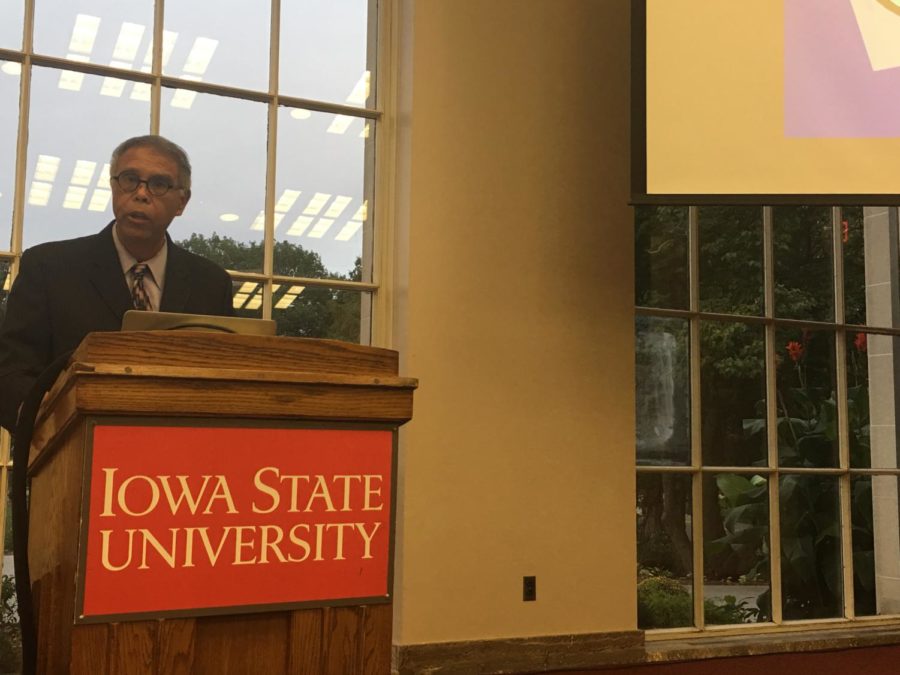ISU professor: Intelligent design is not a science
Talon Delaney/Iowa State Daily
Hector Avalos speaks in the Memorial Union on Sept. 26, 2017.
September 26, 2017
Statistically speaking, none of us should be here.
If the earth were too close to the sun, it would be too hot to harbor life. If its rotational axis differed too greatly, or if there were minor alterations in the earth’s orbital or climatic patterns, life would be impossible.
These culminating factors led Guillermo Gonzalez to co-author a book in 2004 which insisted the theory of intelligent design is wholeheartedly scientific. At the time, Gonzalez was an associate professor of astronomy at Iowa State.
The book was titled The Privileged Planet. Its thesis: Life on earth was intelligently designed, and, more specifically, designed for humans to make scientific discovery.
To Hector Avalos, professor of religion, this thesis is not only presumptuous, it’s also selfish. On Sept. 26 during his lecture at the Memorial Union, Avalos pointed out Gonzalez, as a scientist, has an innate bias when deducing life’s purpose to be the pursuit of the sciences.
“A plumber could very well make the same argument, using the same data, and reason that the universe was created for him to do plumbing,” Avalos told a crowd of over 100 people in the MU’s Campanile Room.
Among the crowd were doctors and faculty, students and community members.
“He’s a very clear thinker,” said Dr. Alan Koslow, who spoke during the Q&A portion of the lecture. Koslow is a medical doctor specializing in wound care and clinical research.
In The Privileged Planet, Gonzalez and his cohort, theologian Jay W. Richards, proport on page 303 that a planet with life has an intrinsic value that is absent on a planet without life. They define “intrinsic value” as such on page 300:
“Such value is difficult to define, but we usually know it when we see it.”
“In other words,” Avalos retorted, “The Privileged Planet is not measuring an objective value, like gravitation or the distance to the sun. This is a value statement. They’re basically saying, ‘I like life, that must be what the planet was made for.’”
Avalos went on to point out other flaws in Gonzalez and Richards’s reasoning, including the massive time-gap between the origin of earth and the scientific method.
Avalos used to believe in an intelligent designer too. He was a devout Pentecostal Christian from childhood up until his late teens. He says his intense studying of biblical studies resulted in the end of his faith. He founded the Atheist and Agnostic Society at ISU, which sponsored the lecture.
“It’s always helpful to hear Avalos [lecture, because he] can ask questions from both sides of an argument,” said Joseph Jackelen, president of the Atheist and Agnostic Society.
The Atheist and Agnostic Society hosted a similar event in 2004, when Avalos and fellow ISU professor John Patterson first presented a counter-thesis to The Privileged Planet. Gonzalez and his provocative book continued to make news at ISU until 2008, when he was denied tenure and left the university.
However, the Intelligent Design argument dates back over a 2000 years. In his book De Natura Deorum, the Roman politician and thinker Cicero insisted the gods gave humans minerals to create jewelry, and that earth has more inherent value than other planets.
Unlike Cicero, Gonzalez often uses precise measurement and facts to reach this conclusion. A conclusion which Avalos claims is still unfounded.
“It would be like if I measured this room perfectly, and then said ‘therefore, the god Krishna designed it,’” Avalos said. “The problem with Intelligent Design isn’t the data, it’s the structure of the argument which makes it false.”







